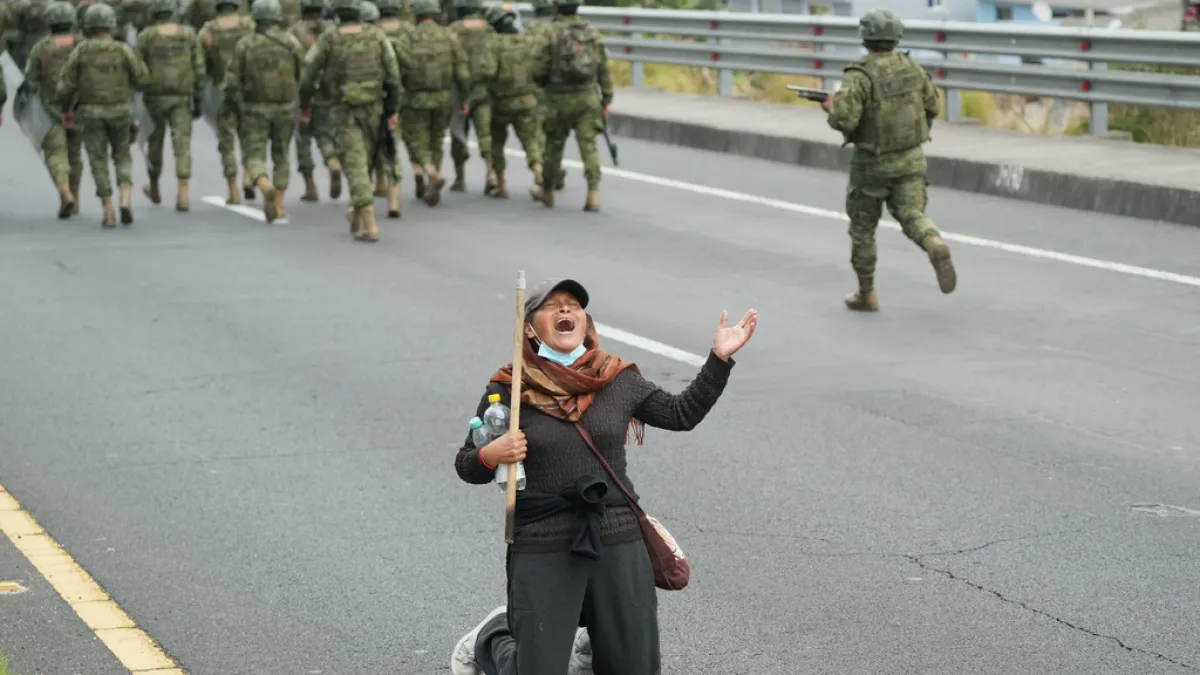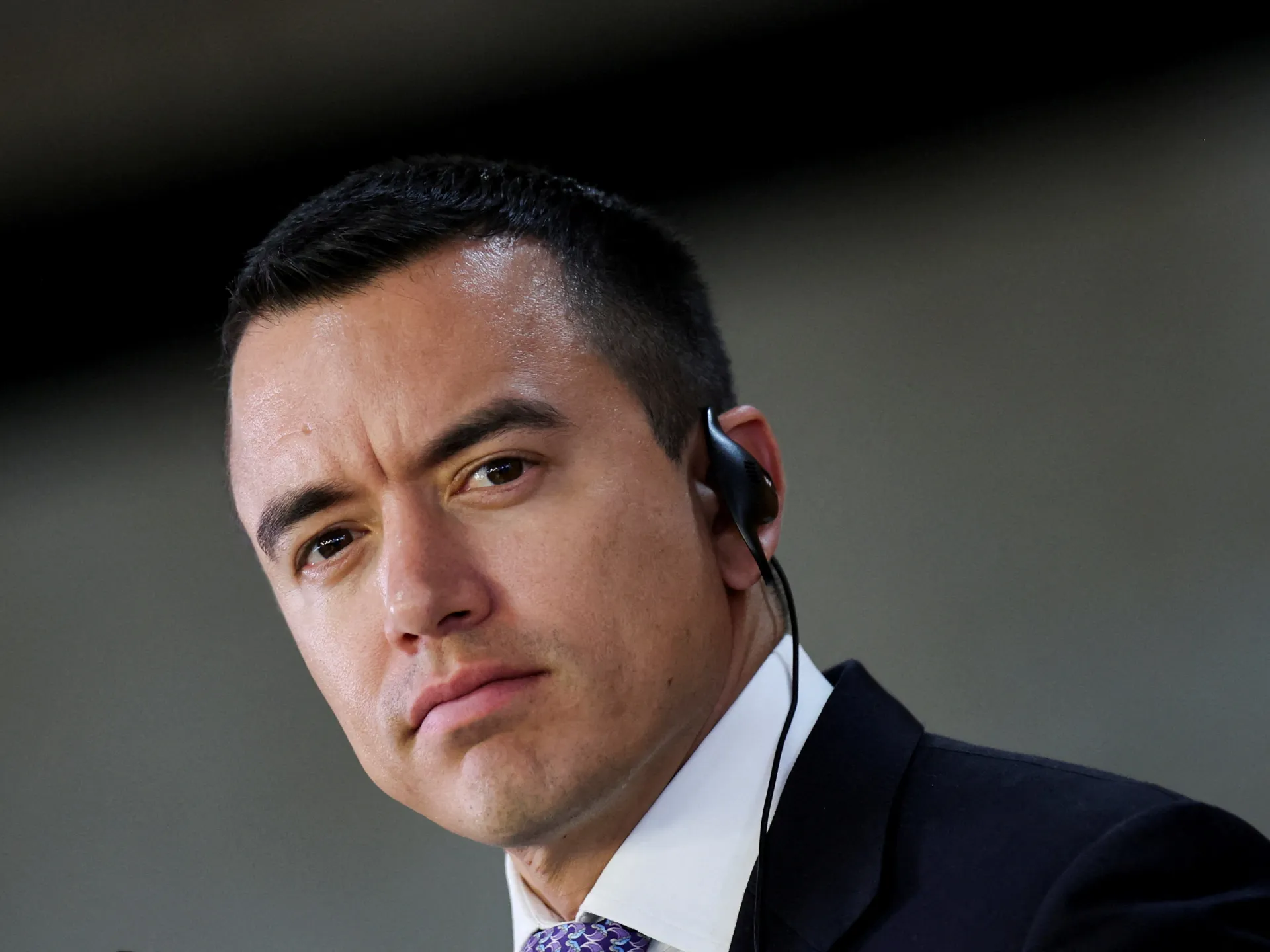Ecuador’s Noboa faces escalating protests over rise in diesel costs | Protests News
Nearly three weeks of striking bus drivers and roadblocks by angry farmers have put Ecuador President Daniel Noboa in one of the tensest moments of his presidency.
The outcry comes in response to the government’s increase in diesel fuel costs, after a subsidy was cut last month.
Recommended Stories
list of 3 itemsend of list
With no signs of dialogue after 18 days, one protester has been killed, numerous protesters and authorities injured, and more than 100 people arrested.
The army announced a large deployment to the capital on Thursday, saying it would prevent vandalism and destruction of property. As many as 5,000 troops were being deployed after dozens of protesters had marched at various sites in the city earlier in the day.
Though the demonstrations called for by Ecuador’s largest Indigenous organisation, CONAIE, are supposed to be nationwide, the most acute impact has been in the northern part of the country, especially Imbabura province, where Noboa won in April’s election with 52 percent of the vote.
On one side is “a president who assumes that after winning the elections he has all of the power at his disposal, who has authoritarian tendencies and no disposition for dialogue”, said Farith Simon, a law professor at the Universidad San Francisco in Quito.
On the other side, he said, is “an Indigenous sector that has shown itself to be uncompromising and is looking to co-govern through force”.
Protesters attacked Noboa’s motorcade with rocks on Tuesday, adding to the tension. The administration denounced it as an assassination attempt.
The Indigenous organisation CONAIE, however, rejected that assertion. It insists its protests are peaceful and that it is the government that is responding with force.
What led to the demonstrations?
The protests were organised by CONAIE, an acronym that translates to the Confederation of Indigenous Nationalities of Ecuador.
The group mobilised its supporters after Noboa decreed the elimination of a subsidy on diesel on September 12.
Diesel is critical to the agricultural, fishing and transport sectors in Ecuador, where many Indigenous people work. The move raised the cost of a gallon (3.8 litres) of diesel to $2.80 from $1.80, which CONAIE said hit the poor the hardest.
The government tried to calm the backlash by offering some handouts, and unions did not join the demonstrations. The confederation rejected the government’s “gifts” and called for a general strike.
What are the protests like?
The Indigenous confederation is a structured movement that played a central role in violent uprisings in 2019 and 2022 that nearly ousted then-Presidents Lenin Moreno and Guillermo Lasso.
Its methods are not always seen as productive, particularly when protests turn violent.
Daniel Crespo, an international relations professor at the Universidad de los Hemisferios in Quito, said the confederation’s demands to return the fuel subsidy, cut a tax and stop mining are efforts to “impose their political agenda”.
The confederation says it’s just trying to fight for a “decent life” for all Ecuadorians, even if that means opposing Noboa’s economic and social policies.
What are Noboa’s policies?
Noboa is a 37-year-old, politically conservative millionaire heir to a banana fortune. He started his second term in May amid high levels of violence.
One of the steps he has taken is raising the value-added tax rate to 15 percent from 12 percent, arguing that the additional funds are needed to fight crime. He has also fired thousands of government workers and restructured the executive branch.
The president has opted for a heavy-handed approach to making these changes and rejected calls for dialogue. He said, “The law awaits those who choose violence. Those who act like criminals will be treated like criminals.”
What has been the fallout?
A protester died last week, and soldiers were caught on video attacking a man who tried to help him.
The images, along with generally aggressive actions by security forces confronting protesters, have fuelled anger and drawn criticism about excessive use of force from organisations within Ecuador and abroad.
The Attorney General’s Office said it was investigating the protester’s death.
Experts warn that the situation could grow more violent if the protests that have largely been in rural areas arrive in the cities, especially the capital, where frustrated civilians could take to the streets to confront protesters.
Some party needs to intervene and lead the different sides to dialogue, perhaps the Catholic Church or civil society organisations, Crespo and Simon agreed.


